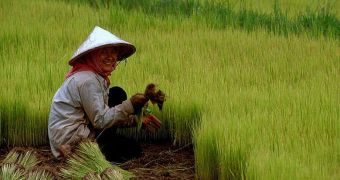The Africa Rice Center (AfricaRice) has recently launched a new campaign, that seeks to improve the amounts and quality of rice being harvested on the Old Continent. Eight countries have signed to join the initiative thus far, and others may do the same too.
The main goal of this one-of-a-kind project is to enhance the quality and marketability of locally-produced rice, especially in the west and east African pilot countries. Experts want to achieve this objective through improving technologies used during and after harvesting.
Scientists and economists say that these improved processing practices and technologies could lead to an increased rice production rate overall, while at the same time contributing to reducing crop losses.
The reason why this project – and others like it – are so important is because rice is gradually becoming one of the most important food sources for Africans. As such, experts need to come up with ways of improving crops as fast as possible.
Increased population growth rates and rapid urbanization have put a strain on available rice supplies to such an extent that Africa is now the world's third largest rice importer. Given the market available for this plant, improving its production records at home could lead to significant local gain.
“The reduction of post-harvest losses of 10% will help increase farmers’ nominal annual income by about $32 million in the eight pilot countries by 2020,” says AfricaRice economist Dr. Aliou Diagne, quoted by AlphaGalileo.
AfricaRice grain quality expert Dr. John Manful adds that one of the reasons why so many losses are recorded in Africa today is that farmers and rice processors still rely on manual technologies for cultivating and handling rice.
“This has resulted in the production of poor quality rice in the region,” Manful explains. “Equal importance should be given to improving the quality of locally-produced rice. Otherwise the lower-quality domestic rice cannot compete with higher-quality imported rice.”
“We are very excited by this project, because post-harvest losses account for up to 25 percent of losses in agricultural production in Sierra Leone. A reduction of these losses could substantially increase food production in the country without increasing the cultivated area,” says Nazir Mahmood.
The official is a research officer from the Sierra Leone Agricultural Research Institute (SLARI). The new project, which is supported by AfricaRice and the Canadian International Development Agency (CIDA), is scheduled to last for about 5 years.

 14 DAY TRIAL //
14 DAY TRIAL //